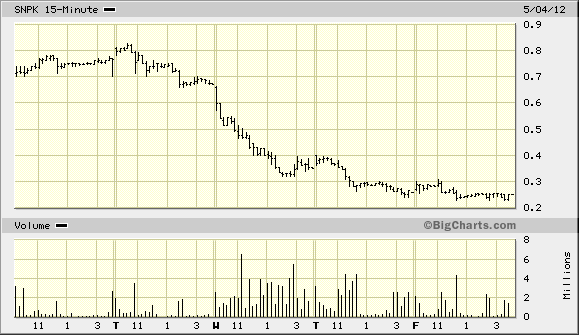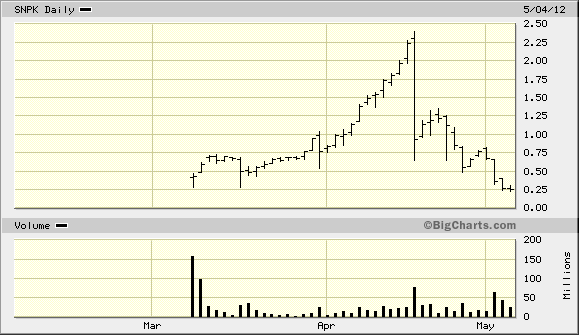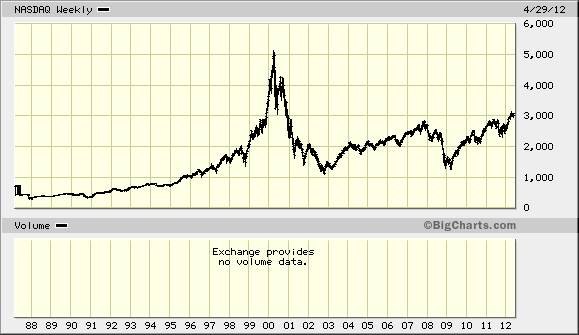

http://www.valuewalk.com/2012/04/ron-paul-vs-paul-krugman-exciting-debate-on-video-with-transcript/
www.valuewalk.com is a recommended blog. Several readers kindly sent me links to the Ron Paul vs. Paul Krugman debate. I am biased toward Ron Paul, but for the life of me I could not understand what Krugman was saying. Perhaps using reason will not convince a religious fanatic.
I stopped reading half way through the discussion, because I knew Ron Paul’s positions but couldn’t understand the logic behind Krugman’s contrary position. Do you? A few examples:
Krugman’s response to Ron Paul:
“You can’t leave the government out of monetary policy. If you think we’re going to let it set itself, it doesn’t happen. If you think you can avoid the government from setting monetary policy, you’re living in the world that was 150 years ago. We have an economy in which money is not just green pieces of paper with faces of dead presidents on them. Money is a part of the financial system that includes a variety of assets – we’re not quite sure where the line between money and non-money is. It’s a continuum.”
What is he saying. Getting the government out of monetary policy would be like regressing? A fall into a primitive state? Krugman makes an “Elephants can fly” assertion.
Has a monetary system worked without government control? Yes, in the brief period of a classical gold standard pre-WWI. However, fractional reserve banking (ponzi finance) operated so, of course, booms and busts would not be eliminated. Another assertion without facts. Fiduciary media existed during the gold standard era.
“History tells us that in fact a completely unmanaged economy is subject to extreme volatility, subject to extreme downturns. I know this legend that some people like that the Great Depression was somehow caused by the government or the Federal Reserve, but that’s not true. The reality is it was a market economy run amok, which happens repeatedly…I’m a believer in capitalism. I want the market economy to be left as free as it can be, but there are limits. You do need the government to step in to stabilize. Depressions are a bad thing for capitalism and it’s the role of the government to make sure they don’t happen, or if they do happen, they don’t last too long.”
So let me try to understand……an unmanaged economy is subject to extreme volatility. But with the Fed operating since 1913, we have had the Great Depression, Inflation of the 1970s, Ultra high interest rates of the 1980s, credit crisis of 2007-2009, a managed economy (the FED cartelizing the fractional reserve banking system and suppressing interest rates) is LESS volatile? What amount of failed economic policies due to intervention would you need to say–this is a failure?
The Federal Reserve helped inflate the boom: http://library.mises.org/books/Murray%20N%20Rothbard/Americas%20Great%20Depression.pdf
Since the inception of the Federal Reserve System in 1913, the supply of money and bank credit in America has been totally in the control of the federal government, a control that has been further strengthened by the U.S. repudiating the domestic gold standard in 1933, as well as the gold standard behind the dollar in foreign transactions in 1968 and finally in 1971. With the gold standard abandoned, there is no necessity for the Federal Reserve or its controlled banks to redeem dollars in gold, and so the Fed may expand the supply of paper and bank dollars to its heart’s content. The more it does so, the more prices tend to accelerate upward, dislocating the economy and bringing impoverishment to those people whose incomes fall behind in the inflationary race.
The Austrian theory further shows that inflation is not the only unfortunate consequence of governmental expansion of the supply of money and credit. For this expansion distorts the structure of investment and production, causing excessive investment in unsound projects in the capital goods industries. This distortion is reflected in the well-known fact that, in every boom period, capital goods prices rise further than the prices of consumer goods.
See what Graham and Buffett had to say about booms and busts:A Study of Market History through Graham Babson Buffett and Others
Krugman seems neither to understand Austrian Business Cycle Theory nor economics (“ABCT”): http://mises.org/daily/4993 and http://mises.org/daily/3579
Krugman is constantly shifting arguments:http://mises.org/daily/5086
Krugman’s response:
“I want to say something about Milton Friedman here because if you actually read what he wrote in his writing for economists, as opposed to some of his loose popular writings, he actually said that the Federal Reserve was responsible for the Great Depression because it didn’t go enough. Friedman’s complaint was that the Federal Reserve did not print enough money. I know this. When Ben Bernanke was talking about the helicopter, he was taking that from Milton Friedman. That was really his idea. The state of the economic debate in America right now Milton Friedman would count on the far left of monetary policy.”
Milton Friedman was advocating for the government to intervene and prevent the market clearing. But why was a non-interventionist policy during the vicious 1920/21 depression so successful:http://www.youtube.com/watch?v=czcUmnsprQI. Both theory, common sense and empirical evidence expose Krugman’s and Friedman’s nonsense.
Here is a seven minute video that explains booms and busts: http://www.youtube.com/watch?v=d0nERTFo-Sk














